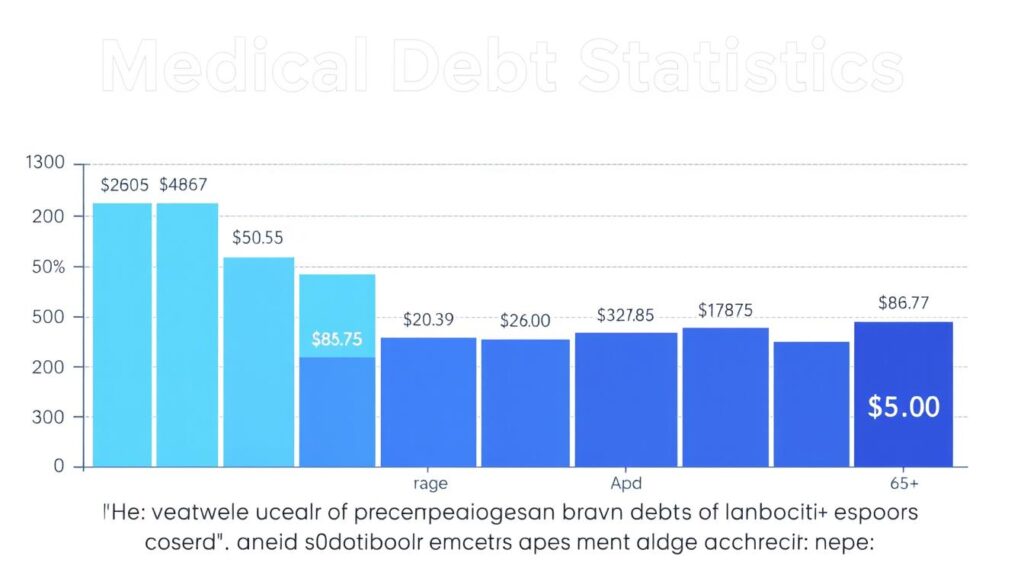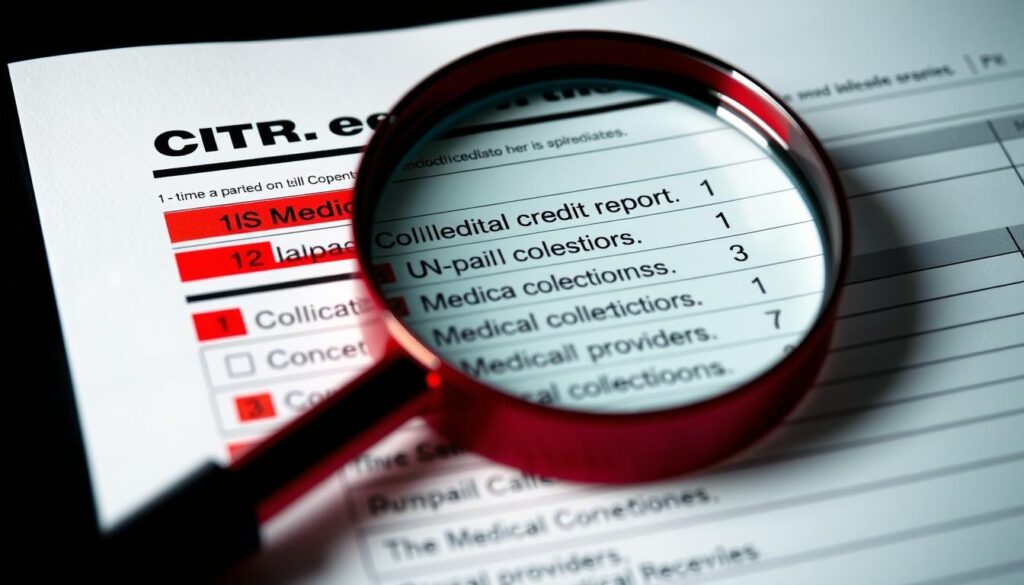Medical debt affects millions of Americans. It can harm your credit score and financial health. This guide helps you remove medical collections using HIPAA rules and credit laws.
Credit reports shape your financial future. They influence loan approvals, insurance rates, and even job prospects. Recent changes offer some relief for medical debt.
Collections under $500, paid off, or less than a year old shouldn’t appear on reports. This change helps many with medical debt improve their credit standing.
HIPAA safeguards your medical information privacy. It requires healthcare providers to keep accurate debt records. Understanding these rules can help you remove wrong medical collections.
Key Takeaways
- Medical debt affects one in five US households
- Credit reports influence loan approvals and employment opportunities
- Recent changes exclude certain medical collections from credit reports
- HIPAA regulations can help in removing inaccurate medical debt
- Understanding your rights is crucial for effective debt removal
Understanding Medical Debt and Credit Reports
Medical debt impacts millions of Americans’ financial health and credit scores. We’ll explore current statistics, credit score effects, and recent reporting changes.
Prevalence of Medical Debt in the US
Medical debt is widespread in the United States. About 15 million Americans owe $49 billion in medical debt. This huge sum shows the need for better healthcare cost management.

Impact of Medical Debt on Credit Scores
Unpaid medical bills can harm credit scores. When medical debt goes to collections, it can lower a credit score by 100 points. This impact can limit housing, loan, and credit card options.
Recent Changes in Medical Debt Reporting
Medical debt reporting is evolving. Credit bureaus have new policies to help consumers. These changes aim to ease the burden.
- Removing paid medical debts from credit reports
- Not reporting outstanding balances under $500
- Extending the grace period before reporting medical debt to credit bureaus
| Old Policy | New Policy |
|---|---|
| Immediate reporting of medical debt | 1-year grace period before reporting |
| All medical debts reported | Debts under $500 not reported |
| Paid debts remained on report for 7 years | Paid debts removed from report |
These changes aim to help those struggling with medical debt. They also improve credit report accuracy. The Biden administration wants to prevent most medical debt from appearing on credit reports.
The Importance of Monitoring Your Credit Report
Your credit report is vital for financial wellness. It affects loans, renting, job prospects, and insurance rates. Your credit score, based on this report, impacts many life aspects.
Regular monitoring helps spot errors or fraud quickly. These issues can harm your financial health if ignored. By staying alert, you protect your financial future.
Credit monitoring services provide real-time alerts about report changes. This allows you to address potential problems early. It’s a proactive approach to maintaining good credit.
“Your credit report is like a financial report card. It’s essential to check it regularly to ensure it accurately reflects your credit history.”
Regular credit monitoring offers several key benefits. It helps detect identity theft early. It allows timely correction of inaccuracies. You’ll better understand what affects your credit score.
- Early detection of identity theft
- Timely correction of inaccuracies
- Better understanding of factors affecting your credit score
- Improved chances of loan approval
You can get one free credit report yearly from each major bureau. Make reviewing these reports a habit. It’s a simple yet effective part of financial wellness.
How to Obtain Your Free Credit Report
Monitoring your financial health requires a free credit report. You’re entitled to one yearly report from Equifax, Experian, and TransUnion. Let’s explore how to access these reports.
AnnualCreditReport.com
AnnualCreditReport.com offers the fastest way to get your free credit report. This official site provides reports from all three bureaus. Fill out the online form with your details for instant access.

Requesting Reports by Phone
Prefer talking to someone? Call 1-877-322-8228 to request your free credit report. Provide your personal information to the representative. Your reports will arrive by mail within 15 days.
Mailing Your Request
Traditional mail works too. Download and complete the Annual Credit Report Request Form. Send it to:Annual Credit Report Request Service
PO Box 105281
Atlanta, GA 30348-5281
Your reports will be processed and mailed within 15 days of receiving your request.
| Method | Processing Time | Convenience |
|---|---|---|
| AnnualCreditReport.com | Instant | High |
| Phone Request | 15 days | Medium |
| Mail Request | 15 days + mailing time | Low |
Carefully review your free credit report for errors or inaccuracies. Regular checks help maintain good credit health. They also allow you to spot potential identity theft early.
Identifying Medical Collections on Your Credit Report
Spotting medical collections on your credit report is vital for financial health. By analyzing your report, you can find issues and boost your credit score. Look for entries labeled as medical collections.
These might appear under various names, including healthcare providers or collection agencies. Check for debts under $500 or less than a year old. Recent changes mean these shouldn’t appear on your report.

- Scan for healthcare-related creditor names
- Check dates of reported debts
- Look for amounts typical of medical bills
- Review collection agency entries for medical origins
Identifying debts is crucial for disputing wrong information. If you find errors or outdated medical collections, gather documents. Use these to challenge entries with credit bureaus.
| Common Medical Collection Identifiers | Action Steps |
|---|---|
| Healthcare provider names | Verify with your medical records |
| Collection agency listings | Request debt validation |
| Unfamiliar medical charges | Check for potential identity theft |
| Paid or settled debts still reported | Dispute with credit bureaus |
Regular credit report checks can uncover hidden medical collections. These may harm your credit score. Address any issues quickly to keep your credit profile healthy.
Removing Medical Collections from Credit Report HIPAA
HIPAA rights are vital when disputing medical debts. They allow you to access records and challenge inaccuracies. This knowledge is key to removing debt from your credit report.
Understanding Your Rights Under HIPAA
HIPAA lets you review your medical records. You can ask for detailed bills with CPT codes to verify charges. If you find mistakes, you can request corrections.

Steps to Dispute Medical Collections
To dispute medical debt:
- Get itemized bills from your healthcare provider
- Compare bills with insurance Explanations of Benefits
- Identify discrepancies or errors
- Contact the provider to resolve issues
- If unresolved, file a dispute with credit bureaus
Leveraging HIPAA for Debt Removal
HIPAA can help remove debt from your credit report. If a provider shares your medical info without consent, you may have grounds for removal.
Document all communications in your efforts to resolve the issue. Be persistent in following up with providers and credit bureaus.
“Knowledge of your HIPAA rights is your best defense against unfair medical collections.”
Verifying the Accuracy of Medical Bills
Reviewing medical bills is vital to avoid overcharging. Mistakes can occur, so it’s important to check every charge. Let’s look at how to get and examine your medical bills effectively.
Obtaining Itemized Bills with CPT Codes
Ask your healthcare provider for itemized medical bills. These should include Current Procedural Terminology (CPT) codes for each service. CPT codes are standard descriptions of medical procedures.
They help you understand what you’re being charged for. These codes make it easier to spot any errors or unusual charges.
- Date of service
- Description of procedure or service
- CPT code for each procedure
- Amount charged for each item
Comparing Bills with Insurance EOBs
Compare your itemized bills with your insurance EOBs (Explanation of Benefits). EOBs show what your insurance covers and what you owe. This comparison can reveal discrepancies or unexpected charges.
| Document | Purpose | Key Information |
|---|---|---|
| Itemized Bill | Shows all charges from provider | CPT codes, service descriptions, dates |
| Insurance EOB | Explains insurance coverage | Covered amounts, patient responsibility |
Carefully review these documents to spot errors and question unexplained charges. This process can help reduce your medical debt. You have the right to understand and verify every part of your medical bills.
Negotiating with Healthcare Providers and Collection Agencies
Medical debt can be daunting, but negotiation offers hope. Many providers and agencies are open to discussions. This gives you a chance to lessen your financial load.
Consider offering a lump-sum settlement. This means paying a portion of your debt at once. Providers often accept this for immediate funds.
If you can’t pay a lump sum, ask about interest-free plans. These let you spread payments over time without extra charges.
Debt settlement is another option to explore. It involves paying less than the full amount owed. This can reduce your debt but may affect your credit score.
- Ask about financial assistance programs
- Request itemized bills to verify charges
- Offer to pay in cash for a discount
- Seek help from a medical billing advocate
Stay patient and persistent during negotiations. Don’t hesitate to ask questions and explore all options. With effort, you can find a solution that works for everyone.
The Role of Credit Bureaus in Medical Debt Reporting
Credit bureaus significantly impact medical debt reporting. Equifax, Experian, and TransUnion have updated their policies to help consumers. These changes aim to reduce medical debt’s impact on credit scores.
Equifax, Experian, and TransUnion Policies
The major credit bureaus have made big changes to medical debt reporting. Paid medical debts no longer appear on credit reports, offering relief to many.
Balances under $500 are not reported anymore. This eases the burden for those with minor medical expenses.
Recent Changes in Medical Debt Reporting Practices
Credit scoring now better reflects the unique nature of medical debt. FICO and VantageScore have reduced medical bills’ impact on credit scores.
This change recognizes that medical debt often results from unexpected events. It’s not always due to financial irresponsibility.
The Consumer Financial Protection Bureau (CFPB) has proposed new rules. These aim to further limit medical debt reporting on credit reports.
| Credit Bureau | Paid Medical Debt | Unpaid Medical Debt Under $500 |
|---|---|---|
| Equifax | Removed from report | Not reported |
| Experian | Removed from report | Not reported |
| TransUnion | Removed from report | Not reported |
Legal Protections for Consumers with Medical Debt
The Fair Debt Collection Practices Act (FDCPA) protects consumers with medical debt. It sets rules for debt collectors’ interactions with you. The FDCPA bans harassment and false statements.
This law allows you to challenge incorrect debts. You can also request debt verification. The FDCPA empowers you to stand up for your rights.
The Consumer Financial Protection Bureau (CFPB) enforces debt collection laws. They oversee credit reporting and collection practices. You can file a complaint with the CFPB if you face issues.
The CFPB is proposing new rules to help consumers. One rule might stop lenders from using medical debt in credit decisions. Another could prevent medical device repossession used as loan collateral.
Understanding your rights under CFPB regulations is vital. It helps you handle medical debt challenges better. Stay informed about current debt collection laws to protect yourself.
Knowledge of consumer rights is your best defense. It shields you from unfair practices. Remember, you have the power to protect your financial well-being.
FAQ
What is the prevalence of medical debt in the United States?
How does medical debt impact credit scores?
What recent changes have been made regarding medical debt reporting?
Why is it important to monitor your credit report?
How can I obtain my free annual credit report?
How can I identify medical collections on my credit report?
What rights do I have under HIPAA to remove medical collections?
How can I verify the accuracy of medical bills?
How can I negotiate with healthcare providers and collection agencies?
What are the policies of major credit bureaus regarding medical debt reporting?
What legal protections are available for consumers with medical debt?
Source Links
- 7 Ways to Remove Medical Debt From Your Credit Report – GoodRx – https://www.goodrx.com/healthcare-access/medical-debt/remove-medical-debt-from-credit-report
- New rule would eliminate medical debt from credit reports – https://www.cnbc.com/select/medical-debt-credit-report/
- How To Remove Medical Collections From Your Credit Report – https://crushmedicaldebt.com/how-to-remove-medical-collections-credit-report/

